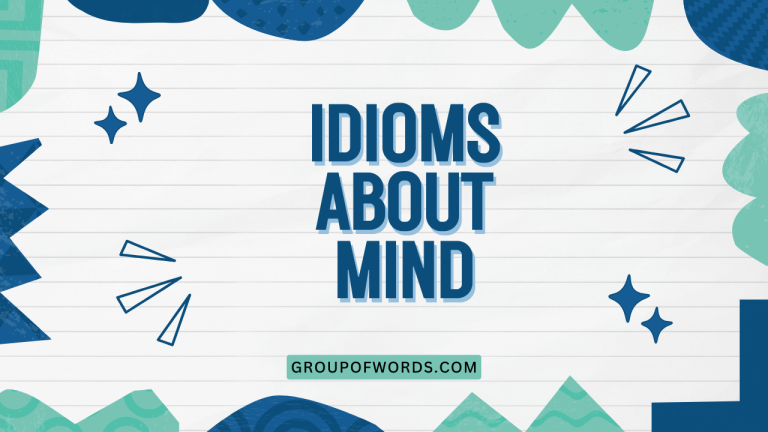Cloudy with a Chance of Idioms: Mastering English Expressions
Idioms add color and depth to the English language, allowing speakers to express complex ideas in a concise and evocative way. Among the most visually rich and frequently used idioms are those that draw inspiration from the sky above, particularly clouds.
Understanding these idioms not only enhances your comprehension of English but also adds flair to your own communication. This article delves into the fascinating world of “cloud idioms,” exploring their meanings, origins, and usage, providing you with the tools to master these expressive phrases.
Whether you’re an English language learner aiming for fluency, a writer seeking to enrich your prose, or simply someone fascinated by the nuances of language, this guide will help you navigate the often-cloudy realm of English idioms. Through clear definitions, practical examples, and engaging exercises, you’ll gain a solid understanding of how to use cloud idioms effectively and confidently.
Table of Contents
- Introduction
- Defining Cloud Idioms
- Structural Breakdown of Cloud Idioms
- Types and Categories of Cloud Idioms
- Examples of Cloud Idioms
- Usage Rules for Cloud Idioms
- Common Mistakes with Cloud Idioms
- Practice Exercises
- Advanced Topics in Cloud Idioms
- Frequently Asked Questions (FAQ)
- Conclusion
Defining Cloud Idioms
An idiom is a phrase or expression whose meaning cannot be understood from the ordinary meanings of the words in it. It’s a figurative way of speaking, where the overall meaning differs from the literal definitions of the individual words.
Cloud idioms, specifically, are idioms that use the imagery of clouds to convey a particular meaning. These idioms tap into our shared understanding of clouds as symbols of weather, change, and sometimes, abstract concepts like mood or clarity.
Cloud idioms function as expressive tools, allowing speakers and writers to add depth and nuance to their communication. They are often used to describe emotions, situations, or characteristics in a more vivid and memorable way than literal language would allow.
The context in which a cloud idiom is used is crucial for understanding its intended meaning.
The use of cloud imagery in idioms is widespread across cultures and languages, though the specific idioms themselves may vary. The universality of clouds as a natural phenomenon makes them a potent source of figurative language.
Structural Breakdown of Cloud Idioms
Cloud idioms, like all idioms, defy a strict grammatical breakdown because their meaning is not derived from their individual components. However, we can analyze their structure to understand how they function within a sentence.
Most cloud idioms are phrases, meaning they consist of two or more words. These words work together to create a single, unified meaning.
They can function as various parts of speech within a sentence, such as:
- Verbs: “To cloud over” (meaning to become gloomy or obscured)
- Nouns: “Head in the clouds” (referring to someone who is impractical or dreamy)
- Adjectives: “Under a cloud” (describing someone who is suspected of wrongdoing)
- Adverbial phrases: “Every cloud has a silver lining” (modifying a verb, suggesting optimism)
The structure of a cloud idiom often includes prepositions (in, on, under, over) to establish relationships between the cloud imagery and the concept being described. Articles (a, an, the) are also common, as are verbs that describe cloud behavior (to cloud, to clear).
While the individual words have their own grammatical functions, the idiom as a whole functions as a single unit of meaning. Trying to dissect the grammar of each word separately will not lead to an understanding of the idiom’s overall significance.
Types and Categories of Cloud Idioms
Cloud idioms can be categorized based on the general sentiment or concept they convey. Here are some common categories:
Idioms of Optimism and Hope
These idioms use cloud imagery to suggest that even in dark or difficult situations, there is always a positive aspect or potential for improvement. They often focus on the idea of clouds eventually clearing and revealing the sun.
Idioms of Negativity and Pessimism
These idioms depict clouds as symbols of gloom, trouble, or suspicion. They often describe situations where something is obscured, threatened, or tainted by negativity.
Idioms of Confusion and Uncertainty
These idioms use clouds to represent a lack of clarity, understanding, or direction. They often describe situations where something is unclear, ambiguous, or difficult to grasp.
Idioms of Impracticality and Unreality
These idioms associate clouds with being detached from reality, lost in daydreams, or pursuing unrealistic goals. They often describe people who are idealistic but lack a grounded perspective.
Examples of Cloud Idioms
The following sections provide detailed examples of cloud idioms, categorized by their general meaning. Each example includes the idiom, its meaning, and a sentence demonstrating its usage.
Examples: Idioms of Optimism and Hope
The following table provides examples of cloud idioms that express optimism and hope. These idioms often suggest that difficult times will eventually pass and better days are ahead.
| Idiom | Meaning | Example Sentence |
|---|---|---|
| Every cloud has a silver lining | There is something positive to be found in every negative situation. | Even though she lost her job, she knew that every cloud has a silver lining and saw it as an opportunity to pursue her passion. |
| On cloud nine | Extremely happy or euphoric. | After receiving the acceptance letter from her dream university, she was on cloud nine. |
| Head in the clouds | Dreamy, impractical, or not paying attention to reality. | He has his head in the clouds if he thinks he can start a business with no capital. |
| Under a cloud | Under suspicion or disgrace. | The politician resigned while still under a cloud of corruption allegations. |
| Cloud over | To become gloomy or obscured. | Her face clouded over when she heard the bad news. |
| A cloud hanging over someone | A feeling of worry or anxiety about something that might happen. | A cloud was hanging over the company because of the pending lawsuit. |
| Clear the air | To resolve a misunderstanding or disagreement. | They needed to clear the air after their argument to move forward. |
| With one’s head in the clouds | Not paying attention to what is happening around one; daydreaming. | She always has her head in the clouds during math class. |
| Every dark cloud has a silver lining | Similar to “every cloud has a silver lining,” emphasizing the darkness before the positive aspect. | Although it was a tough experience, every dark cloud has a silver lining; she learned a lot about herself. |
| Above the clouds | In a state of happiness or detachment from earthly worries. | Winning the lottery made him feel like he was above the clouds. |
| Cloudless sky | A situation free from problems or worries. | After months of hard work, the project was finally completed under a cloudless sky. |
| To clear the clouds | To remove confusion or uncertainty. | The lawyer’s explanation helped to clear the clouds surrounding the contract. |
| Floating on cloud nine | Very happy and carefree. | They were floating on cloud nine after their wedding. |
| Looking at clouds | Daydreaming or being lost in thought. | Instead of working, he was just looking at clouds. |
| Living in the clouds | Being out of touch with reality; having unrealistic dreams. | She’s living in the clouds if she thinks she’ll become a famous actress overnight. |
| Chasing rainbows in the clouds | Pursuing unrealistic or unattainable goals. | He’s chasing rainbows in the clouds if he believes he can solve world hunger on his own. |
| Sunshine through the clouds | A glimpse of hope or happiness in a difficult situation. | The baby’s laughter was a sunshine through the clouds during their financial struggles. |
| Above the gathering clouds | Escaping from troubles or worries. | Meditation helps her to feel above the gathering clouds of daily stress. |
| Silver linings in the clouds | Positive aspects even in challenging circumstances. | Despite the setbacks, they found silver linings in the clouds of their failed business venture. |
| Finding sunshine through the clouds | Discovering positivity despite difficulties. | Even after the accident, she was determined to find sunshine through the clouds. |
| See through the clouds | Understand something despite confusion or difficulty. | The detective was able to see through the clouds of misinformation and solve the case. |
| Riding on the clouds | Feeling extremely happy and successful. | After the successful launch of their product, the team was riding on the clouds. |
| A break in the clouds | A temporary relief from a difficult situation. | The rain stopped, offering a break in the clouds during their hike. |
| Walking on clouds | Feeling extremely happy or elated. | After getting the promotion, he felt like he was walking on clouds. |
Examples: Idioms of Negativity and Pessimism
The following table provides examples of cloud idioms that express negativity and pessimism. These idioms often describe situations where something is obscured, threatened, or tainted by negativity.
| Idiom | Meaning | Example Sentence |
|---|---|---|
| Under a cloud of suspicion | Suspected of having done something wrong. | He lived under a cloud of suspicion after the robbery. |
| Cloud one’s judgment | To make it difficult for someone to think clearly or make good decisions. | His anger clouded his judgment, leading him to make a rash decision. |
| Cast a cloud over | To spoil or ruin something that was previously enjoyable. | The news of the economic downturn cast a cloud over the holiday season. |
| A cloud of doubt | A feeling of uncertainty or disbelief. | A cloud of doubt hung over the project’s success. |
| Dark clouds gathering | Trouble or problems are approaching. | Dark clouds were gathering over the company as sales declined. |
| Clouded future | An uncertain or pessimistic outlook. | Many young people face a clouded future due to economic instability. |
| A shadow of a cloud | A slight or insignificant problem. | Their relationship was strained by a shadow of a cloud after the argument. |
| To cloud the issue | To make something more confusing or difficult to understand. | The politician’s vague answers only clouded the issue further. |
| Under a dark cloud | Experiencing a period of sadness or misfortune. | The family was under a dark cloud after the loss of their home. |
| The clouds of war | The threat or imminent outbreak of war. | The clouds of war were looming over the region. |
| Storm clouds brewing | Indicating an impending crisis or conflict. | Storm clouds were brewing as the negotiations stalled. |
| Cloudy with a chance of tears | A situation likely to lead to sadness or disappointment. | After their breakup, her mood was cloudy with a chance of tears. |
| Beneath a heavy cloud | Experiencing a significant burden or problem. | The business was operating beneath a heavy cloud of debt. |
| A cloud of despair | A feeling of hopelessness. | A cloud of despair settled over the town after the factory closed. |
| Clouds of gloom | Feelings of sadness or depression. | Clouds of gloom surrounded her after the bad news. |
| A cloudy day | A day filled with sadness or difficulty. | It was a cloudy day for him when he lost his job. |
| Under a threatening cloud | Being in a precarious or dangerous situation. | The company was operating under a threatening cloud of bankruptcy. |
| Clouds on the horizon | Indicating potential future problems. | There are clouds on the horizon for the real estate market. |
| A cloud of secrecy | A situation where information is being deliberately withheld. | A cloud of secrecy surrounded the government’s dealings. |
| Darkening clouds | Worsening problems or threats. | Darkening clouds indicated that the storm was intensifying. |
| Under a shadow of a cloud | Slightly affected by suspicion or negativity. | He performed well, but was still under a shadow of a cloud due to past mistakes. |
| Clouds of uncertainty | A lack of clarity or confidence about the future. | Clouds of uncertainty hang over the economy. |
| To have a cloud over one’s head | To be experiencing problems or unhappiness. | She’s had a cloud over her head ever since the accident. |
| A cloud of controversy | A situation surrounded by public disagreement or scandal. | A cloud of controversy surrounded the new law. |
| Under a gathering cloud | Experiencing increasing problems or threats. | The project was under a gathering cloud of budget overruns. |
Examples: Idioms of Confusion and Uncertainty
The following table provides examples of cloud idioms that express confusion and uncertainty. These idioms often describe situations where something is unclear, ambiguous, or difficult to grasp.
| Idiom | Meaning | Example Sentence |
|---|---|---|
| In a fog | Confused, disoriented, or unclear about something. | I’ve been in a fog since I woke up this morning; I can’t seem to focus. |
| Clouded judgment | Impaired ability to make clear decisions. | His judgment was clouded by fatigue, so he made a mistake. |
| A haze of confusion | A state of bewilderment or lack of clarity. | A haze of confusion surrounded the witness’s testimony. |
| Lost in the clouds | Confused or out of touch with reality. | The complex instructions left me feeling lost in the clouds. |
| Cloudy thinking | Unclear or muddled thoughts. | Cloudy thinking prevented him from solving the problem. |
| A cloud of doubt | A feeling of uncertainty or disbelief. | A cloud of doubt hung over the company’s claims. |
| Through a cloud darkly | Seeing something indistinctly or imperfectly. | We see the future through a cloud darkly. |
| To cloud the waters | To make something unclear or confusing. | The politician’s comments only clouded the waters further. |
| Under a cloud of uncertainty | In a state of doubt or unpredictability. | The business operated under a cloud of uncertainty due to the pending regulations. |
| Veiled in clouds | Obscured or hidden from view. | The details of the agreement were veiled in clouds. |
| Misty clouds of confusion | A situation full of uncertainty and lack of clarity. | Misty clouds of confusion surrounded the company’s new policy. |
| A cloud of ignorance | A lack of knowledge or understanding. | A cloud of ignorance veiled the discussion on climate change. |
| Lost in a cloud of questions | Overwhelmed by many unanswered questions. | After the presentation, she was lost in a cloud of questions. |
| Behind a cloud of misconception | Misunderstood or misinterpreted due to false beliefs. | The artist’s intentions were hidden behind a cloud of misconception. |
| Under a hazy cloud | In a state of partial obscurity or lack of clarity. | The events were remembered under a hazy cloud of time. |
| Swathed in clouds of mystery | Surrounded by enigmatic or unexplained circumstances. | The ancient artifact was swathed in clouds of mystery. |
| With a mind in the clouds | Absent-minded or not fully aware of what is happening. | With his mind in the clouds, he forgot his keys. |
| Wrapped in a cloud of unknowing | Completely unaware or ignorant of something. | He was wrapped in a cloud of unknowing about the consequences. |
| A cloud of apprehension | A feeling of anxiety or fear about the future. | A cloud of apprehension hung over the negotiations. |
| Blotted out by clouds | Something being obscured or hidden completely. | The sun was blotted out by clouds, creating a gloomy atmosphere. |
| Darkened by clouds of doubt | Made less certain or hopeful due to suspicion. | Their prospects were darkened by clouds of doubt. |
| Through a glass darkly | Seeing something indirectly or not clearly (similar to “through a cloud darkly”). | Historians often see the past through a glass darkly. |
| Overcast with doubt | Dominated by feelings of uncertainty or disbelief. | His decision was overcast with doubt, leading to hesitation. |
| Shadowed by clouds of uncertainty | Influenced by a lack of clarity about the future. | The business plan was shadowed by clouds of uncertainty. |
| Veiled by a cloud | Hidden or obscured, making it difficult to understand. | The truth was veiled by a cloud of lies. |
Examples: Idioms of Impracticality and Unreality
The following table provides examples of cloud idioms that associate clouds with being detached from reality, lost in daydreams, or pursuing unrealistic goals.
| Idiom | Meaning | Example Sentence |
|---|---|---|
| Head in the clouds | Dreamy, impractical, or not paying attention to reality. | He has his head in the clouds if he thinks he can start a business with no capital. |
| Living in the clouds | Being out of touch with reality; having unrealistic dreams. | She’s living in the clouds if she thinks she’ll become a famous actress overnight. |
| Building castles in the clouds | Making plans that are not realistic or practical. | They were building castles in the clouds when they envisioned a life of luxury without working hard. |
| Dreaming in the clouds | Having unrealistic or fanciful dreams. | He was dreaming in the clouds about becoming a millionaire. |
| Lost in a cloud of fantasy | Engaged in unrealistic or imaginary scenarios. | She was lost in a cloud of fantasy, imagining herself as a princess. |
| Chasing rainbows in the clouds | Pursuing unrealistic or unattainable goals. | He’s chasing rainbows in the clouds if he believes he can solve world hunger on his own. |
| Sailing on clouds of illusion | Living in a false or deceptive reality. | They were sailing on clouds of illusion, unaware of the financial troubles ahead. |
| Floating in a cloud of dreams | Being immersed in unrealistic or fanciful aspirations. | She was floating in a cloud of dreams, hoping to win the lottery. |
| Dwelling in the clouds of imagination | Spending too much time in one’s own fantasies. | He was dwelling in the clouds of imagination instead of facing his responsibilities. |
| Existing in a cloud of unreality | Living in a state divorced from the real world. | She was existing in a cloud of unreality after the traumatic event. |
| Spinning fantasies in the clouds | Creating elaborate and unrealistic scenarios in one’s mind. | He was spinning fantasies in the clouds about becoming a famous athlete. |
| Wandering through clouds of make-believe | Engaging in a world of pure imagination. | The children were wandering through clouds of make-believe during their playtime. |
| Drifting on clouds of fancy | Being carried away by whimsical and unrealistic ideas. | She was drifting on clouds of fancy, planning an extravagant wedding she couldn’t afford. |
| Building air castles | Similar to “building castles in the clouds,” emphasizing the lack of foundation. | They were just building air castles when they discussed their plans for a space colony. |
| Lost in cloud-cuckoo-land | Being completely out of touch with reality (a more extreme version of “head in the clouds”). | He’s lost in cloud-cuckoo-land if he thinks he can get away with that. |
| With feet not on the ground | Not practical or realistic; similar to having one’s head in the clouds. | Her ideas are interesting, but her feet aren’t on the ground. |
| Living a daydream | Existing in a state of fantasy or wishful thinking. | He’s living a daydream if he thinks he can retire at 30. |
| Soaring above reality | Being detached from the practical aspects of life. | Her vision for the company was soaring above reality, making it difficult to implement. |
| Dreaming of pie in the sky | Hoping for something that is unlikely to happen (similar to chasing rainbows). | They were dreaming of pie in the sky when they expected instant success. |
| Lost in flights of fancy | Engaged in unrealistic or whimsical thoughts. | She was lost in flights of fancy, imagining herself as a famous writer. |
| Floating in a dream world | Living in an imaginary or unrealistic state. | He’s floating in a dream world if he thinks he can avoid hard work. |
| Building a fantasy world | Creating an elaborate and unrealistic imaginary life. | She was building a fantasy world to escape her problems. |
| Creating castles in the sky | Similar to “building castles in the clouds,” but emphasizing the vastness of the unreal plans. | The entrepreneur was creating castles in the sky with his ambitious but unrealistic business plan. |
| Lost in a world all their own | Completely detached from the real world and immersed in personal fantasies. | The children were lost in a world all their own, playing with imaginary friends and scenarios. |
| Living in a fool’s paradise | Being happy because you are not aware of real problems. | They were living in a fool’s paradise, unaware of the impending economic crisis. |
Usage Rules for Cloud Idioms
Using cloud idioms correctly requires understanding their specific meanings and the contexts in which they are appropriate. Here are some general rules to follow:
- Know the Meaning: Always ensure you understand the precise meaning of the idiom before using it. Misusing an idiom can lead to confusion or miscommunication.
- Consider the Context: Idioms are often informal and may not be suitable for all situations. Consider the tone and audience of your communication. Formal writing or professional settings may require more literal language.
- Maintain Grammatical Consistency: While idioms themselves don’t follow strict grammatical rules, ensure that the rest of your sentence is grammatically correct. The idiom should fit seamlessly into the sentence structure.
- Avoid Overuse: Using too many idioms can make your writing or speech sound unnatural or forced. Use them sparingly and purposefully.
- Be Aware of Cultural Differences: Some idioms may not translate well across cultures or may have different meanings in different dialects of English. Be mindful of your audience’s background.
- Pay Attention to Tense: Adjust the tense of the verbs within the idiom to match the tense of your sentence. For example, “He was on cloud nine” (past tense) vs. “He is on cloud nine” (present tense).
It’s also crucial to remember that idioms are fixed expressions. While you can sometimes make minor adjustments (e.g., changing the tense of a verb), you should generally avoid altering the wording of an idiom, as this can change its meaning or make it sound nonsensical.
Common Mistakes with Cloud Idioms
Using idioms correctly can be challenging, and there are several common mistakes that English learners often make. Here are some examples, along with corrections:
| Incorrect | Correct | Explanation |
|---|---|---|
| Every sky has a silver lining. | Every cloud has a silver lining. | Using the wrong noun (sky instead of cloud) changes the meaning. |
| He is on cloud number nine. | He is on cloud nine. | Adding “number” is unnecessary and grammatically incorrect in this idiom. |
| She has a head in the clouds. | She has her head in the clouds. | The possessive pronoun “her” is necessary to indicate whose head is being referred to. |
| They cleared the air from the room. | They cleared the air. | The idiom “clear the air” doesn’t require specifying where the air is being cleared. |
| He was under a cloud of suspect. | He was under a cloud of suspicion. | Using the wrong noun (suspect instead of suspicion) alters the meaning. |
| She lives in the clouds her whole life. | She has lived in the clouds her whole life. | The tense and verb form need to be correct to fit the sentence. |
| The future is clouded. | The future is clouded over. | While “clouded” can be used, “clouded over” is a more common and idiomatic way to express uncertainty about the future. |
| He is building houses in the clouds. | He is building castles in the clouds. | Using the wrong noun (houses instead of castles) changes the meaning. |
| She was on cloud the nine. | She was on cloud nine. | The article “the” is unnecessary and grammatically incorrect in this idiom. |
| A cloud of confusing. | A cloud of confusion. | Using the wrong noun form (confusing instead of confusion) alters the meaning and grammatical correctness. |
Paying attention to these common mistakes and practicing the correct usage will help you avoid errors and use cloud idioms with confidence.
Practice Exercises
Test your understanding of cloud idioms with these practice exercises. Choose the correct idiom to complete each sentence.
| Question | Answer Choices | Correct Answer |
|---|---|---|
| 1. Despite the challenges, he believed that __________. | a) every star has a silver lining b) every cloud has a silver lining c) every rain has a silver lining | b) every cloud has a silver lining |
| 2. After winning the championship, the team was __________. | a) on floor nine b) on cloud nine c) in space nine | b) on cloud nine |
| 3. She always has her __________, dreaming of becoming a famous singer. | a) head in the ground b) head in the stars c) head in the clouds | c) head in the clouds |
| 4. The company was operating __________ after the scandal. | a) under a shadow b) under a tree c) under a cloud | c) under a cloud |
| 5. They needed to __________ after their misunderstanding. | a) clear the water b) clear the air c) clear the land | b) clear the air |
| 6. The politician’s vague answers only served to __________ the issue. | a) cloud over b) clear up c) cloud over | a) cloud over |
| 7. He’s __________ if he thinks he can get away with cheating on the exam. | a) living in the trees b) living in the clouds c) living in the sea | b) living in the clouds |
| 8. The negotiations stalled, and __________ were brewing between the two countries. | a) storm clouds b) snow clouds c) sunny clouds | a) storm clouds |
| 9. The details of the agreement were __________ in secrecy. | a) veiled b) revealed c) displayed | a) veiled |
| 10. He’s __________ if he believes he can become a millionaire overnight without any effort. | a) building bridges in the sky b) building castles in the clouds c) building roads in the sky | b) building castles in the clouds |
Answers: 1. b, 2. b, 3. c, 4. c, 5. b, 6. a, 7. b, 8. a, 9. a, 10. b
Here is another practice exercise. Identify the meaning of the idiom in each sentence.
| Sentence | Answer Choices | Correct Answer |
|---|---|---|
| 1. Despite the setbacks, she knew every cloud has a silver lining. | a) There is always a positive aspect to every negative situation. b) Clouds are always made of silver. c) Storms always bring good luck. | a) There is always a positive aspect to every negative situation. |
| 2. After getting engaged, she was on cloud nine. | a) She was literally floating in the sky. b) She was extremely happy. c) She was feeling unwell | b) She was extremely happy. |
| 3. He has his head in the clouds if he thinks he will win the lottery. | a) He is realistic about his chances. b) He is being practical. c) He is being unrealistic. | c) He is being unrealistic. |
| 4. The company was operating under a cloud after the scandal. | a) The company was operating normally. b) The company was operating under suspicion. c) The company was operating with increased profits. | b) The company was operating under suspicion. |
| 5. They decided to clear the air after their argument. | a) They decided to clean the room. b) They decided to resolve their differences. c) They decided to ignore the problem. | b) They decided to resolve their differences. |
Advanced Topics in Cloud Idioms
For advanced learners, exploring the nuances and origins of cloud idioms can provide a deeper appreciation of the English language. Here are some areas for further study:
- Etymology: Research the origins of specific cloud idioms to understand their historical and cultural context. Many idioms have fascinating stories behind them.
- Regional Variations: Investigate how cloud idioms may vary in meaning or usage across different English-speaking regions (e.g., the United States, the United Kingdom, Australia).
- Literary Analysis: Examine how authors use cloud idioms in literature to create imagery, convey themes, and develop characters.
- Cross-Cultural Comparisons: Compare cloud idioms in English with similar expressions in other languages. This can reveal interesting differences and similarities in how cultures perceive clouds and their symbolic meanings.
- Idiom Creation: Experiment with creating your own cloud idioms, considering how you can use cloud imagery to express new ideas or emotions.
By delving into these advanced topics, you can gain a more sophisticated understanding of cloud idioms and their role in the English language.
Frequently Asked Questions (FAQ)
Why are idioms important in English?
Idioms are important because they add color, depth, and nuance to the English language. They allow speakers and writers to express complex ideas in a concise and evocative way.
Understanding idioms is crucial for comprehending spoken and written English, as they are frequently used in everyday conversation, literature, and media.
How can I learn cloud idioms effectively?
To learn cloud idioms effectively, focus on understanding their meanings in context. Use flashcards, practice exercises, and real-life examples to reinforce your knowledge.
Pay attention to how native speakers use idioms in conversation and writing. Reading widely and listening to English media can also help you internalize idioms.
Are cloud idioms used in formal writing?
While idioms are generally more common in informal contexts, they can be used in formal writing if they are appropriate for the tone and audience. Use idioms sparingly and purposefully in formal writing, and ensure that they enhance rather than detract from your message.
Can I create my own idioms?
While it’s possible to create your own idioms, it’s important to remember that idioms become established through widespread usage. A newly created idiom may not be understood by others unless it catches on and becomes part of common parlance.
Focus on understanding and using existing idioms before attempting to create your own.
How do I avoid misusing idioms?
To avoid misusing idioms, always ensure you understand their precise meanings and the contexts in which they are appropriate. Pay attention to common mistakes and practice using idioms correctly.
If you’re unsure about the meaning or usage of an idiom, consult a dictionary or ask a native speaker for clarification.
Conclusion
Cloud idioms offer a fascinating glimpse into the expressive power of the English language. By understanding their meanings, origins, and usage, you can enhance your comprehension of English and add flair to your own communication.
Whether you’re an English language learner or a seasoned writer, mastering cloud idioms will enrich your linguistic toolkit and allow you to express yourself with greater precision and creativity.
From the optimistic promise of “every cloud has a silver lining” to the uncertain ambiguity of being “lost in a fog,” cloud idioms capture a wide range of human experiences and emotions. By incorporating these idioms into your vocabulary, you can add depth, nuance, and color to your language, making your communication more engaging and effective.






